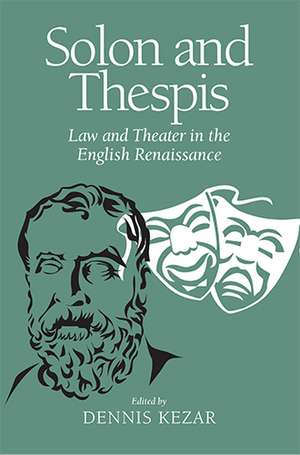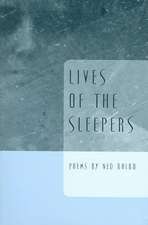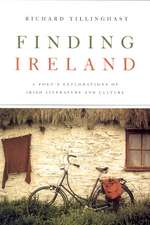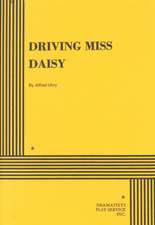Solon and Thespis – Law and Theater in the English Renaissance
Autor Dennis Kezaren Limba Engleză Paperback – 14 ian 2007
| Toate formatele și edițiile | Preț | Express |
|---|---|---|
| Paperback (1) | 290.52 lei 6-8 săpt. | |
| MR – University of Notre Dame Press – 14 ian 2007 | 290.52 lei 6-8 săpt. | |
| Hardback (1) | 694.98 lei 6-8 săpt. | |
| Wiley – 29 sep 2022 | 694.98 lei 6-8 săpt. |
Preț: 290.52 lei
Nou
Puncte Express: 436
Preț estimativ în valută:
55.60€ • 57.44$ • 46.27£
55.60€ • 57.44$ • 46.27£
Carte tipărită la comandă
Livrare economică 26 martie-09 aprilie
Preluare comenzi: 021 569.72.76
Specificații
ISBN-13: 9780268033132
ISBN-10: 0268033137
Pagini: 302
Dimensiuni: 152 x 229 x 16 mm
Greutate: 0.46 kg
Ediția:1st Edition
Editura: MR – University of Notre Dame Press
ISBN-10: 0268033137
Pagini: 302
Dimensiuni: 152 x 229 x 16 mm
Greutate: 0.46 kg
Ediția:1st Edition
Editura: MR – University of Notre Dame Press
Recenzii
“The recent ‘law and literature’ movement has produced several intriguing studies of the relation between these discourses and Solon and Thespis . . . [is an] exciting addition to that corpus. It suggests that fiction and the law are mutually determining. The essays collected in Solon and Thespis focus on the complicated relation of the law and the theatre in Early Modern England . . . . [The] analyses are incisive and warnings timely.” —Times Literary Supplement, May 4, 2007
“Dennis Kezar's superb collection of essays Solon and Thespis: Law and Theater in the English Renaissance also interrogates the extent to which theater's 'professional deceit' can do any more than debase 'privileged truth.' Taken as a whole, this volume is the place to send both undergraduates and graduates who want to get up to speed on this fascinating field of early modern studies.” —Studies in English Literature, 1500-1900, 48, 2, Spring 2008
“. . . The introduction admirably outlines the field within which the essays examine the negotiations between law and theatre; it also pre-empts worries about randomness by foregrounding its conscious decision to represent the variety of critical negotiations addressing and extending the diversity of the interrelation.” —The Review of English Studies, vol. 59, no. 240, June 2008
“Kezar offers nine essays, plus an introduction and epilogue, which investigate connections and interactions between English law and the theater in the 16th and 17th centuries. As one might expect, half the essays deal with plays by Shakespeare and Jonson, with contributions on lesser writers such as Chapman and Sackville rounding out the collection. The essays avoid the standard legal concerns of the Renaissance theater and instead investigate more subtle connections.” —Choice, August 2007, Vol. 44, No. 11
Notă biografică
Dennis Kezar is associate professor of English at Vanderbilt University.
Contributors: Matthew Greenfield, Paul Cantor, Frances Teague, Heather Dubrow, Ernest B. Gilman, Dennis Kezar, Debora Shuger, Karen J. Cunningham, Luke Wilson, and Deak Nabers.
Descriere
"In this attractively titled collection of essays on law and theater in the English Renaissance, Dennis Kezar has assembled an impressive array of talent to focus on the productive and yet vexed relationship of theater and the state. Plays 'tell lies' to their audiences: so argued Solon in his riposte to Thespis, to be followed in due course by Plato's attack on poetry in the Republic and all that Jonas Barish has studied under the rubric of The Antitheatrical Prejudice. This battleground here affords a rich opportunity for an exploration of 'an institutional antagonism over the tenuous distinction between theater's inconsequential fiction and the real world's socially consequential fact.' This volume is a truly valuable contribution to the growing interest in law and literature, here brought to bear on the great drama of Shakespeare, Jonson, Dekker, Marston, Chapman, and their contemporaries." —David Bevington, Phyllis Fay Horton Distinguished Service Professor in the Humanities, University of Chicago
"The diversity of topics explored in this excellent collection makes it a valuable addition to the burgeoning field of early modern law, theater, and literature studies. The essays included here touch on a wide range of material—from Dekker to Shakespeare to Chapman and Bacon; and in doing so, they explore the tensions between Solon and Thespis in such a way as to make the work of analyzing the relationship between literature and the law seem not only fruitful, but in fact essential to a deeper understanding of both." —Jeremy Lopez, University of Toronto
This volume contains contributions by literary critics and historians who demonstrate that theater and law were not simply relevant to each other in the early modern period; they explore the physical spaces in which early modern law and drama were performed, the social and imaginative practices that energized such spaces, and the rhetorical patterns that make the two institutions far less discrete and far more collaborative than has previously been recognized.


















